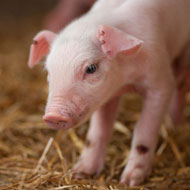
Minister urged to act now or risk serious damage to the pig industry
The Government is being urged to bolster the country's defences against African swine fever (ASF), or risk devastation to the pig industry.
Chairman of the National Pig Association (NPA), Richard Longthrop, has called for security at border posts to be improved to prevent contaminated meat entering the country illegally.
The calls follow a recent announcement that the disease has been found in wild boar in Lithuania. BPEX has also urged pig farmers to review their biosecurity and warn staff travelling to and from Eastern Europe that the disease can be transported via contaminated meat.
While harmless to humans, ASF is a highly contagious and often fatal disease in pigs, with mortality rates as high as 100 per cent. It can survive in raw, cooked, cured and even frozen meat for months.
In a letter to food and farms minister George Eustice, Mr Longthrop warns that the virus has the potential to cause serious harm to the UK pig industry, with mass slaughters and a ban on British pork exports ﹣ which represent nearly a quarter of pig farmers' income.
"The UK pig industry is just emerging from its own recession created by high feed prices," Mr Longthrop wrote. "To be struck with African swine fever now would be a blow from which some would not recover.
"We﹣that is the pig industry and Government﹣must do all we can to ensure African swine fever, or any other exotic disease, does not spread to the UK.
"The loss of exports valued at £350m would be devastating to the pig industry, a loss to UK trade, and would undermine all the great work that the pig industry and Defra have put into developing export markets for British pork and high-performance breeding pigs."
The NPA chief is calling for a poster and leaflet campaign at border posts and in-flight announcements on planes arriving from Lithuania.



 HMRC has invited feedback to its communications regarding the employment status of locum vets and vet nurses.
HMRC has invited feedback to its communications regarding the employment status of locum vets and vet nurses.